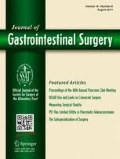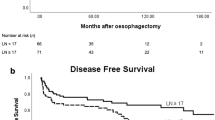Abstract
Introduction
The purpose of this study was to evaluate the effects of neoadjuvant therapy on lymph node harvest (LNH), lymph node ratio (LNR), and overall survival rates after esophagectomy.
Methods
A retrospective analysis of 111 patients who underwent esophagectomy for esophageal adenocarcinoma from 2001 to 2010 was performed. Patients were divided into two groups: neoadjuvant chemoradiotherapy prior to surgery (NEOSURG) versus surgery alone (SURG).
Results
There were 83 patients (75 %) in the NEOSURG group and 28 (25 %) in the SURG group with a mean age of 66 and 67 years, respectively. The median LNH in the NEOSURG group and SURG group was 16.0 and 15.5, respectively (p = 0.57). Within the NEOSURG group, the median LNH was 16 for complete responders, 14 for partial responders, 16 for nonresponders, and 18 in those who were pathologically upstaged (p = 0.434). The median LNR was 0, 0, 0.1, and 0.2, respectively (p < 0.001). Complete response after neoadjuvant therapy demonstrated a trend toward improved survival (p = 0.056).
Conclusion
The LNH was not significantly influenced by neoadjuvant treatment or pathologic response. The LNR was inversely related to pathologic response after neoadjuvant therapy. Complete pathologic response to neoadjuvant therapy trends to improve survival rates.


Similar content being viewed by others
References
Twine CP, Lewis WG, Morgan MA, Chan D, Clark GW, Havard T, Crosby TD, Roberts SA, Williams GT. The assessment of prognosis of surgically resected oesophageal cancer is dependent on the number of lymph nodes examined pathologically. Histopathology 2009;55:46–52.
Peyre CG, Hagen JA, DeMeester SR, Altorki NK, Ancona E, Griffin SM, Hölscher A, Lerut T, Law S, Rice TW, Ruol A, van Lanschot JJ, Wong J, DeMeester TR. The number of lymph nodes removed predicts survival in esophageal cancer: an international study on the impact of extent of surgical resection. Ann Surg 2008;248:549–56.
Yang HX, Xu Y, Fu JH, Wang JY, Lin P, Rong TH. An evaluation of the number of lymph nodes examined and survival for node-negative esophageal carcinoma: data from China. Ann Surg Oncol 2010;17:1901–11.
Altorki NK, Zhou XK, Stiles B, Port JL, Paul S, Lee PC, Mazumdar M. Total number of resected lymph nodes predicts survival in esophageal cancer. Ann Surg 2008;248:221–6.
Mariette C, Piessen G, Briez N, Triboulet JP. The number of metastatic lymph nodes and the ratio between metastatic and examined lymph nodes are independent prognostic factors in esophageal cancer regardless of Neoadjuvant chemoradiation or lymphadenectomy extent. Ann Surg 2008;247:365–71.
Lewis I. The surgical treatment of carcinoma of the oesophagus; with special reference to a new operation for growths of the middle third. Br J Surg 1946;34:18–31.
de Steur WO, Dikken JL, Hartgrink HH. Lymph node dissection in resectable advanced gastric cancer. Dig Surg. 2013;30:96–103.
Hoppo T, Jobe BA, Hunter JG. Minimally invasive esophagectomy: the evolution and technique of minimally invasive surgery for esophageal cancer. World J Surg 2011;35:1454–63.
Orringer MB, Marshall B, Iannettoni MD. Eliminating the cervical esophagogastric anastomotic leak with a side-to-side stapled anastomosis. J Thorac Cardiovasc Surg 2000;119:277–88.
Rice TW, Blackston EH, Rusch VW. 7th Edition of the AJCC Cancer Staging Manual: Esophagus and Esophagogastric Junction. Ann Surg Oncol 2010;17:1721–1724.
Groth SS, Virnig BA, Whitson BA, DeFor TE, Li ZZ, Tuttle TM, Maddaus MA. Determination of the minimum number of lymph nodes to examine to maximize survival in patients with esophageal carcinoma: data from the Surveillance Epidemiology and End Results. J Thorac Cardiovasc Surg 2010;139:612–620.
Bollschweiler E, Besch S, Drebber U, Schröder W, Mönig SP, Vallböhmer D, Baldus SE, Metzger R, Hölscher AH. Influence of Neoadjuvant chemoradiation on the number and size of analyzed lymph nodes in esophageal cancer. Ann Surg Oncol 2010;17:3187–94.
Merkow RP, Bilimoria KY, McCarter MD, Chow WB, Ko CY, Bentrem DJ. Use of Multimodality Neoadjuvant Therapy for Esophageal Cancer in the United States: Assessment of 987 Hospitals. Ann Surg Oncol 2012;19:357–64.
Sjoquist KM, Burmeister BH, Smithers BM, Zalcberg JR, Simes RJ, Barbour A, Gebski V. Australasian Gastro-Intestinal Trials Group. Survival after Neoadjuvant chemotherapy or chemoradiotherapy for resectable oesophageal carcinoma: an updated meta-analysis. Lancet Oncol 2011;12:681–92.
Aiko S, Yoshizumi Y, Ishizuka T, Sakano T, Kumano I, Sugiura Y, Maehara T. Reduction rate of lymph node metastasis as a significant prognostic factor in esophageal cancer patients treated with neoadjuvant chemoradiation therapy. Dis Esophagus 2007;20:94–101.
Orditura M, Galizia G, Morgillo F, Martinelli E, Lieto E, Vitiello F, DiMartino N, Pacelli R, Renda A, Ciardiello F, DeVita F. Complete response to preoperative chemoradiation and survival in esophageal cancer: a pooled analysis of three single-institutions phase II trials. Dis Esophagus 2012;25:130–6.
Stiles BM, Christos P, Port JL, Lee PC, Paul S, Saunders J, Altorki NK. Predictors of survival in patients with persistent nodal metastases after preoperative chemotherapy for esophageal cancer. J Thorac Cardiovasc Surg 2010;139:387–94.
Saha AK, Sutton C, Rotimi O, Dexter S, Sue-Ling H, Sarela AI. Neoadjuvant chemotherapy and surgery for esophageal adenocarcinoma: prognostic value of circumferential resection margin and stratification of N1 category. Ann Surg Oncol 2009;16:1364–70.
Le Prise E, Etienne PL, Meunier B, Maddern G, Ben Hassel M, Gedouin D, Boutin D, Campion JP, Launois B. A randomized study of chemotherapy, radiation therapy, and surgery versus surgery for localized squamous cell carcinoma of the esophagus. Cancer 1994;73:1779–84.
Tepper J, Krasna MJ, Niedzwiecki D, Hollis D, Reed CE, Goldberg R, Kiel K, Willett C, Sugarbaker D, Mayer R. Phase III trial of trimodality therapy with cisplatin, fluorouracil, radiotherapy, and surgery compared with surgery alone for esophageal cancer: CALGB 9781. J Clin Oncol 2008;26:1086–92.
Dolan JP, Kaur T, Diggs BS, Luna RA, Sheppard BC, Schipper PH, Tieu BH, Bakis G, Vaccaro GM, Holland JM, Gatter KM, Conroy MA, Thomas CA Jr, Hunter JG. Significant understaging is seen in clinically staged T2N0 esophageal cancer patients undergoing esophagectomy. Dis Esophagus. 2015 Feb 24. doi: 10.1111/dote.12334.
Stiles BM, Mirza F, Coppolino A, Port JL, Lee PC, Paul S, Altorki NK. Clinical T2-T3N0M0 esophageal cancer: the risk of node positive disease. Ann Thorac Surg 2011;92:491–6; discussion 496–8.
Chen WH, Chao YK, Chang HK, Tseng CK, Wu YC, Liu YH, Hsieh MJ, Liu HP. Long-term outcomes following Neoadjuvant chemoradiotherapy in patients with clinical T2N0 esophageal squamous cell carcinoma. Dis Esophagus 2012;25:250–5.
Rice TW, Mason DP, Murthy SC, Zuccaro G Jr, Adelstein DJ, Rybicki LA, Blackstone EHJ. T2N0M0 esophageal cancer. Thorac Cardiovasc Surg 2007;133:317–24.
Acknowledgments
Dr. Dolan’s authorship in this publication was supported by the Oregon Clinical and Translational Research Institute (OCTRI), and a grant (no. UL1TR000128) from the National Center for Advancing Translational Sciences (NCATS) of the National Institutes of Health (NIH). The content is solely the responsibility of the authors and does not necessarily represent the official views of the NIH.
Author information
Authors and Affiliations
Corresponding author
Additional information
Renato A. Luna and James P. Dolan contributed equally to this work.
Rights and permissions
About this article
Cite this article
Luna, R.A., Dolan, J.P., Diggs, B.S. et al. Lymph Node Harvest During Esophagectomy Is Not Influenced by Use of Neoadjuvant Therapy or Clinical Disease Stage. J Gastrointest Surg 19, 1201–1207 (2015). https://doi.org/10.1007/s11605-015-2821-4
Received:
Accepted:
Published:
Issue Date:
DOI: https://doi.org/10.1007/s11605-015-2821-4




